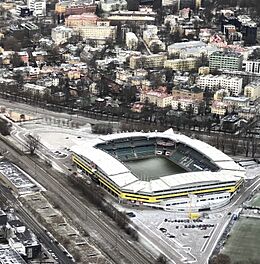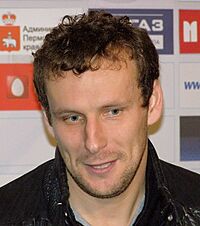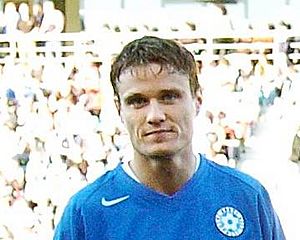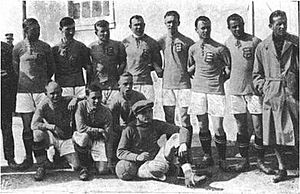Estonia national football team facts for kids
| Nickname(s) | Sinisärgid (Blueshirts) Kalevipojad | ||
|---|---|---|---|
| Association | Estonian Football Association (Eesti Jalgpalli Liit – EJL) |
||
| Confederation | UEFA (Europe) | ||
| Head coach | Jürgen Henn | ||
| Captain | Karol Mets | ||
| Most caps | Konstantin Vassiljev (158) | ||
| Top scorer | Andres Oper (38) | ||
| Home stadium | Lilleküla Stadium | ||
| FIFA code | EST | ||
|
|||
| FIFA ranking | |||
| Current | 96 |
||
| Highest | 47 (March 2012) | ||
| Lowest | 137 (October 2008) | ||
| Elo ranking | |||
| Current | 86 |
||
| Highest | 51 (August 1927, September 1929, 6 August 1930) | ||
| Lowest | 175 (August 1995 to May 1996) | ||
| First international | |||
(Helsinki, Finland; 17 October 1920) |
|||
| Biggest win | |||
(Tallinn, Estonia; 26 July 1928) (Faro, Portugal; 7 October 2017) |
|||
| Biggest defeat | |||
(Helsinki, Finland; 11 August 1922) (Mainz, Germany; 11 June 2019) |
|||
| Baltic Cup | |||
| Appearances | 27 (first in 1928) | ||
| Best result | Champions (1929, 1931, 1938, 2020, 2024) |
||
| Website | jalgpall.ee | ||
The Estonia men's national football team represents Estonia in international football games. It is controlled by the Estonian Football Association. The team's home ground is Lilleküla Stadium in Tallinn, the capital city.
Estonia's first match was against Finland in 1920. They lost that game 6–0. The team played in the 1924 Olympic Games in Paris, but lost their only match 1–0 to the United States. For a long time, from 1940 to 1991, Estonia was occupied by the Soviet Union. During this time, they could not have their own national football team. After Estonia became independent again in August 1991, their first official match was a 1–1 draw against Slovenia in June 1992.
Estonia has never qualified for the FIFA World Cup or the UEFA European Championship. However, they came very close in 2011. They reached the UEFA Euro 2012 qualifying play-offs by finishing second in their group. This was a big achievement for Estonian football. They also reached the UEFA Euro 2024 qualifying play-offs by doing well in the 2022–23 UEFA Nations League D.
The team also plays in the Baltic Cup championship. This tournament happens every two years between Estonia, Latvia, and Lithuania. Estonia has won the Baltic Cup five times, most recently in 2024.
The player with the most international games for Estonia is Konstantin Vassiljev, who has played 158 matches. Andres Oper holds the record for most goals, with 38 goals.
Contents
Team History
Early Years (1918–1940)
Football came to Estonia in the early 1900s, brought by English sailors. At that time, Estonia was part of the Russian Empire. The national team was formed after Estonia's war of independence (1918–1920). Their first game was on October 17, 1920, in Helsinki, Finland, which they lost 6–0.
The Estonian Football Association was started on December 14, 1921. It joined FIFA in 1923. Estonia's only time playing in a major tournament before World War II was at the 1924 Summer Olympics in Paris. They lost their only match 1–0 to the United States.
The Baltic football contest started in 1928. Estonia won this tournament in 1938. Their first FIFA World Cup qualifying match was on June 11, 1933, against Sweden. This was also the first FIFA World Cup qualifying match ever played! Estonia lost 6–2.
In the 1938 World Cup qualifiers, Estonia got their first points. They beat Finland 1–0. However, they did not qualify for the World Cup. Estonia's biggest win was 6–0 against Lithuania in 1928. Their biggest loss was 10–2 to Finland in 1922. On July 18, 1940, Estonia played their last official game as an independent nation for over 50 years. They won 2–1 against Latvia.
Soviet Occupation (1940–1991)
In 1940, the Soviet Union took over Estonia. Because of this, the national football team stopped existing. During the German occupation (1941–1944), the team played a few unofficial friendly games. But when Soviet troops returned in 1944, many players were forced to join the army or fled the country.
Football became less popular in Estonia during the Soviet era. The Estonian SSR (Soviet Socialist Republic) had its own team, but it could not play in international competitions. In the mid-1970s, Roman Ubakivi helped restart Estonian football. He trained young players, including future national team stars like Mart Poom and Martin Reim.
In 1990, as Estonia worked to regain independence, an exhibition match was held against Latvia. This game remembered their last official match 50 years earlier.
Return to International Football (1991–1996)
Estonia became fully independent again on August 20, 1991. The team returned to international football in November 1991 in the Baltic tournament in Lithuania. Their first official match recognized by FIFA was a 1–1 draw against Slovenia in June 1992. This historic game was led by coach Uno Piir.
The team faced challenges, including financial difficulties and the condition of their stadium. In the 1994 FIFA World Cup qualifiers, Estonia finished last in their group. They scored only one goal and let in 27. They drew one game against Malta.
For the UEFA Euro 1996 qualifying tournament, the team was coached by Roman Ubakivi. They did not get any points in this tournament. From October 1993 to October 1996, Estonia did not win a single game for almost three years. Their FIFA ranking dropped to 135th in February 1996.
New Coach and Better Results (1996–2007)
Results started to get better when Teitur Thordarson from Iceland became the first foreign coach. His first win was in October 1996, a 1–0 victory over Belarus in a 1998 World Cup qualifier.
A famous incident happened on October 9, 1996. A match against Scotland had to be rescheduled because the Estonian team did not show up. This was a protest about the stadium's floodlights. The game was later played in Monaco and ended in a 0–0 draw. Estonia finished fifth in their World Cup qualifying group, which was an improvement.
For the Euro 2000 qualifiers, Estonia had three wins and two draws. They scored 15 goals and let in 17. They even drew 0–0 at home against Scotland. They set a team record of 11 points in this campaign.
After Teitur Thordarson left, Dutch coach Arno Pijpers took over. A new modern stadium, Lilleküla Stadium, opened on June 2, 2001. It was built outside the Lilleküla railway line. The first game there was a 4–2 loss to the Netherlands in a World Cup qualifier. All 9,300 tickets for the match sold out in six hours.
In the 2002 FIFA World Cup qualifiers, Estonia won two games against Andorra and drew twice with Cyprus. They finished with eight points. In UEFA Euro 2004 qualifying, they also had two wins against Andorra and draws with Croatia and Bulgaria.
Under Dutch coach Jelle Goes, Estonia had their most successful World Cup qualifying campaign for the 2006 World Cup. They had five wins, two draws, and five losses, earning 17 points. They finished fourth in their group. However, UEFA Euro 2008 qualifying was not as good, and Goes left in June 2007.
Recent Years (2008–Present)
In November 2007, Tarmo Rüütli became head coach again. He had coached the team before in 1999–2000. In 2008, Estonia's form was mixed. They lost 7–0 to Bosnia, which caused their FIFA ranking to drop to 137th. However, they also drew 0–0 with Turkey and beat Armenia 1–0 in the 2010 World Cup qualifiers.
The year 2009 was the 100th anniversary of Estonian football. They played their first-ever match against Brazil, who were the top-ranked team in the world. Brazil won 1–0.
Estonia achieved a famous victory on October 8, 2010. They won 3–1 away against Serbia in a 2012 European Championship qualifier. Serbia was ranked 15th in the world at the time.
In March 2011, Estonia had a great run of games. They beat Uruguay 2–0 in a friendly match. Uruguay had just reached the semi-finals of the 2010 World Cup. This was a big win for Estonia. They also drew 1–1 at home against Serbia.
The team then had some tough losses. But they bounced back with wins against Slovenia and Northern Ireland. These wins helped them reach their best-ever FIFA ranking of 58th.
Estonia finished their Euro 2012 qualifying campaign with a win against Northern Ireland. They then entered a play-off against the Republic of Ireland. They lost the home game 0–4 but drew 1–1 away. This was Estonia's best qualifying campaign, earning 16 points.
By June 2012, Estonia had played against all 52 of UEFA's member teams at that time. They have since played Gibraltar, but not the newest member, Kosovo.
On March 28, 2017, Estonia had another famous win, beating Croatia 3–0 at home in a friendly match. On June 10, 2021, Estonia won the Baltic Cup for the fourth time, beating Latvia 2–1. This was their first Baltic Cup win since 1938. They won it again in 2024.
Home Stadium
Estonia plays its home games at the Lilleküla Stadium in Tallinn. This stadium opened in 2001 and can hold about 14,400 fans. It is also known as A. Le Coq Arena because of its sponsor, a big Estonian brewery. Lilleküla Stadium is the largest football stadium in Estonia and is also home to the club FC Flora.
Before 2001, the team played at the Kadriorg Stadium. This stadium opened in June 1926. It holds 5,000 seats and is also used for athletics events.
Estonia has also played friendly matches in other cities like Kohtla-Järve, Kuressaare, Narva, Pärnu, Rakvere, Tartu, Valga, and Viljandi.
Team Kit
The Estonian national team's home kit is usually a blue shirt, black shorts, and white socks. For away games, they wear a white shirt, black shorts, and blue socks. The goalkeeper often wears a yellow jersey. The kit design changes every two years. Since 1997, Nike has supplied the team's kits.
|
|
|
Team Supporters
The main supporters' group for Estonia is called Jalgpallihaigla, which means Football Hospital. This group has over 600 members. They help with tickets and act as a link between fans and the Estonian Football Association. At home games, they are the loudest fans, sitting in the Southern section of Lilleküla Stadium.
Many Estonian fans travel to away games. In October 2007, about two thousand Estonian fans went to Wembley Stadium in England for a European championship qualifier. Tallinn has also hosted many away fans. In 1938, 2,000 Latvian fans came to Kadriorg Stadium for a Baltic Cup match. In 2009, 1,700 fans from Bosnia and Herzegovina visited Lilleküla Stadium.
Player Records
Here are some of the top players for Estonia:
Most Games Played
| Rank | Player | Caps | Goals | Years Played |
|---|---|---|---|---|
| 1 | Konstantin Vassiljev | 158 | 26 | 2006–2024 |
| 2 | Martin Reim | 157 | 14 | 1992–2009 |
| 3 | Marko Kristal | 143 | 9 | 1992–2005 |
| 4 | Andres Oper | 134 | 38 | 1995–2014 |
| 5 | Ragnar Klavan | 130 | 3 | 2003–2024 |
Note: Players in bold are still playing for Estonia.
Top Goal Scorers
| Rank | Player | Goals | Caps | Average | Years Played |
|---|---|---|---|---|---|
| 1 | Andres Oper | 38 | 134 | 0.28 | 1995–2014 |
| 2 | Indrek Zelinski | 27 | 103 | 0.26 | 1994–2010 |
| 3 | Konstantin Vassiljev | 26 | 158 | 0.16 | 2006–2024 |
| 4 | Henri Anier | 23 | 102 | 0.23 | 2011–present |
| 5 | Eduard Ellmann-Eelma | 21 | 60 | 0.35 | 1921–1935 |
Note: Players in bold are still playing for Estonia.
Competition History
Estonia has played in qualifiers for the FIFA World Cup and UEFA European Championship many times. They have not yet qualified for the main tournaments.
FIFA World Cup Qualifiers
Estonia first played in World Cup qualifiers in 1933. After regaining independence, they started playing again for the 1994 World Cup. They have played in every qualifying campaign since then. Their best performance was in the 2006 qualifiers, where they earned 17 points.
UEFA European Championship Qualifiers
Estonia started playing in European Championship qualifiers for Euro 1996. Their best result was in the Euro 2012 qualifiers, where they reached the play-offs. They earned 16 points in that campaign.
UEFA Nations League
Estonia has also played in the UEFA Nations League. In the 2022–23 season, they won their group in League D, which helped them get a chance to play in the Euro 2024 play-offs.
Olympic Games
Estonia's only time playing in a major tournament was at the 1924 Summer Olympics in Paris, France. They played one match and lost 1–0 to the United States. Even though they lost, they stayed in Paris to play friendly matches.
Baltic Cup
The Baltic Cup is a regional tournament between Estonia, Latvia, and Lithuania. Estonia has won this cup five times: in 1929, 1931, 1938, 2020, and 2024.
Key Moments
- First World Cup qualifier: June 11, 1933, against Sweden (6–2 loss). This was the first FIFA World Cup qualification match ever.
- First World Cup qualifier win: August 19, 1937, against Finland (1–0).
- First European Championship qualifier: September 4, 1994, against Croatia (2–0 loss).
- First World Cup qualifier win after independence: October 5, 1996, against Belarus (1–0).
- First European Championship qualifier win: June 4, 1998, against Faroe Islands (5–0).
Honours
Regional Titles
- Baltic Cup
- Champions (5): 1929, 1931, 1938, 2020, 2024
Images for kids
-
Estonia's national team has played against England four times.
-
Estonia vs Turkey at the Lilleküla Stadium in 2008. The game was a 0–0 draw.
-
Estonia played against Brazil at the Lilleküla Stadium in 2009. Brazil won 1–0.
See also
 In Spanish: Selección de fútbol de Estonia para niños
In Spanish: Selección de fútbol de Estonia para niños
 | George Robert Carruthers |
 | Patricia Bath |
 | Jan Ernst Matzeliger |
 | Alexander Miles |








